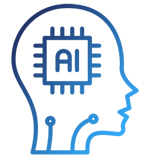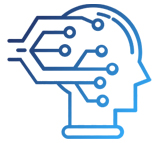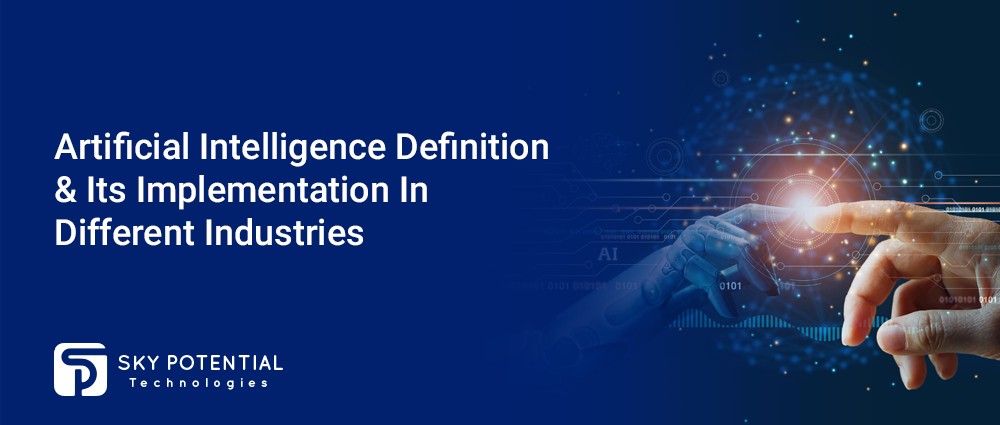- AI

Artificial Intelligence

Smart Products & Services
We follow Smart Products & Services

Intelligent Business Functions & Processes
We follow Intelligent Business Functions & Processes

Robotic Process Automation
We follow Robotic Process Automation

Personalized
healthcareWe follow Personalized healthcare

Identifying at-risk patients
We follow Identifying at-risk patients

Optimized routing and scheduling
We follow Optimized routing and scheduling
- ML

Machine Learning

Predictive
AnalyticsWe follow Predictive Analytics

Service Personalization
We follow Service Personalization

NLP
We follow NLP (Natural Language Processing)

Stock Market Forecasting
We follow Stock Market Forecasting

Fraud Prevention
We follow Fraud Prevention

Recommender engines
We follow Recommender engines
- blockchain

Blockchain

Public Blockchain
We follow Public Blockchain

Private Blockchain
We follow Private Blockchain

DEFI
We follow DEFI Blockchain

Initial stake pool offering development
We follow initial stake pool offering development
- IOT

Internet of Things
- AR
- Business Solutions

Business Solution

Business Performance Management
We follow Business Performance Management

Decision Making & Big Data Analytics
We follow Decision Making & Big Data Analytics

Enterprise Data Management
We follow Enterprise Data Management
- Apps

Apps

Native Apps
We follow Native Apps

Cross Platform Apps
We follow Cross Platform Apps

Web Apps
We follow Web Apps

Hybrid Apps
We follow Hybrid Apps

Cloud Native Apps
We follow Cloud Native Apps
- Lab

Artificial Intelligence Definition & Its Implementation In Different Industries
Artificial Intelligence was once restricted to futuristic movies and comics. We loved to see plots involving AI in movies like Terminator, AI, and more. But then the technology actually hit the market and took the world by storm. It can provide a plethora of opportunities for businesses. The best part is that you don’t have to do a lot to integrate Artificial Intelligence into your business. It is highly convenient and in the long run, will save a lot of pretty penny for you. You might have to pay a one-time charge, but after that, it will be smooth sailing. Nowadays, it has become so common that any business, no matter what its size, has access to it and a lot of them are integrating AI with their current systems to ramp up productivity and efficiency.
But the fact remains that a lot of businesses still don’t know what AI actually is. Surveys have shown that a lot of top business leaders have no details about AI, what it does, and what it can bring to the table for their businesses. They are still thinking of AI as robots that take over the world and highly advanced software that can take over the world. That is why they still feel a little hesitant when approaching an AI consulting firm or an AI software development firm for that matter.
What is Artificial Intelligence (AI)?
Artificial Intelligence refers to software-based systems that can make decisions that usually required a human mind to make. These AI solutions have the same level of expertise as a human. There are three things that a system needs to have to be called an Artificial Intelligence system. They are:
- Intelligence
- Intentionality, and
- Adaptability.
Implementation and Adaptation of AI
There are a wide variety of ways that businesses can adapt to Artificial Intelligence. They can use a whole plethora of AI strategies to make their businesses more secure, faster, easier, smoother, and better for their customers. For example, they can automate their accounting or the collection of customer data. They can manage their inventory better as well as their supply chain management.
Here are some of the ways that AI can benefit various industries. For this purpose, we have chosen the Finance industry, E-Commerce, Manufacturing, Telecommunication, and the automotive industry.
AI in Finance

There are several ways that any financial institution or a finance business can use AI to increase their productivity, sales, and more. With the help of AI, they can offer personalized experiences to their customers. They could build chatbots that can provide guidance as well as answer questions 24×7 for all customers. This could be via text or through voice messages. A lot of customer queries can be handled by these chatbots without the need of an actual human being. Also, financial institutions can easily monitor and track their customers and analyze their behavior to provide more personalized services. This will result in greater customer loyalty, referrals, word of mouth, and more.
AI in Retail

As far as retail is concerned, AI has been a game-changer and it doesn’t seem like stopping anytime soon. Retail businesses can increase their productivity, generate more revenues, and automate the majority of their tasks with the help of AI. They can use chatbots, just like in the above example, to cater to their clients and customers. They can use AI to better manage their inventory. They can use AI to give their customers a more personalized experience. They can also use AI to monitor their customers’ data and their purchasing behavior. This can help them save huge amounts. Also, they can keep track of what’s selling and what’s not. They can purchase their raw materials more carefully, according to seasonal variations and more. There are literally a million things they can do with the help of AI.
AI in Manufacturing

AI has revolutionized the manufacturing industry. So much so, that they have a new term for it. Experts are calling it Industry 4.0. AI is being used to predict maintenance and faults in equipment so that manufacturers can lower the possibility of failure. They can also use AI to predict when a part should be replaced or when it has lived its beneficial life. AI is also capable of monitoring the entire manufacturing cycle and finding out minute details that can enhance the production process and eliminate mistakes. This can save a business huge amount as well as enhance their reputation in the market.
AI in Telecommunication

Just like the above-mentioned industries, Telecommunication businesses can highly increase customer engagement and loyalty with chatbots. They can also use AI to find out what the customers are complaining about and offer an instant solution. AI is capable of analyzing thousands if not millions of data and analyzing it as well as finding out patterns among it that humans might miss. It can categorize emails, chats, and voice messages and send them to the relevant departments. AI can recommend various products or services to the customers based on their history and purchasing behavior. Businesses in the telecommunication sector can take their business to the top by providing their customers with the ultimate experience.
Conclusion
These are only a few industries that we have mentioned. The reality is that every industry can benefit from implementing AI. These could be government, advertising, education, healthcare, and many more. As time goes on, more and more businesses are opting for AI-based solutions. If you want your business to survive, then you have to go for AI too.
Also Read: Using AI To Combat SARS COVID-19

















































Leave a Reply